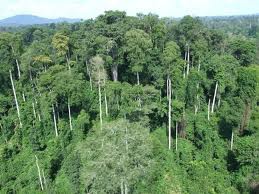The high incidence of illegal chainsaw milling and other illegal logging and legal harvest accounts for the drastic reduction of Ghana’s forest cover, which currently stands at 1.6 million hectares from 8 million hectares at the beginning of the 90’s, B&FT has learnt.
The current rate of deforestation in the country is calculated to be about 65,000 hectares per annum - of which one of the major causes is known to be illegal chainsaw milling. The activities of illegal chainsaw operators have become a serious threat to sustenance of the country’s forest, which if not tackled with the seriousness that it deserves could spell doom for the country.
In spite of several attempts over the years to address this menace, it still remains a serious governance issue; and without finding any viable solution to, it will be difficult to implement any sound sustainable forest management.
According to available data, illegal chainsaw milling alone accounts for over 84% of local lumber supply with an estimated volume of 497,000 cubic metres and market value of GH¢279million (US$200million).
The annual cut of illegal chainsaw milling is projected to be about 1.7 million cubic metres (m³), and together with other illegal logging and harvesting amounts to 3.7 million cubic metres (m³) -- almost a double the official annual allowable cut of 2 million cubic metres (m³).
The enterprise is believed to employ about 130,000 people and provides livelihood support for about 650,000 people across the country. Due to inadequate enforcement of the ban on illegal chainsaw operations, the enterprise is said to have also contributed to the emergence of forest-based enterprises like carpentry shops, wood villages/markets, and charcoal production.
The Government of Ghana in 2008 signed the Voluntary Partnership Agreement (VPA) with the European Union (EU) to govern trade in timber products. The conditions under the VPA mandated that only legally produced timber should be exported to the EU market. This agreement also included the supply of legal lumber to the local market, which currently is made up of 84% illegal chainsaw timber.
It is in accordance with this that the Forestry Commission and Tropenbos International Ghana have indicated having developed a new policy that seeks to improve the supply of legal lumber to the domestic market through a collaborative effort between the two bodies.
Addressing the activities of chainsaw operations in the country has long been one of the major challenges faced by the Forestry Commission and other agencies set up to curb the menace.
This latest development, which has received endorsement from the Ministry of Lands Natural Resources and other stakeholders, not only targets eliminating illegal chainsaw operations but also seeks to ensure a supply of legal lumber to the domestic market on sustainable basis. It also seeks to promote good forest governance and provide a framework that facilitates production and trade of legal timber on the domestic market.
The underlying principle of the policy is to provide a framework for developing and regulating the domestic timber market -- in anticipation of expansion and growth of the construction and housing industry -- while addressing the drivers of illegal chainsaw operations, deforestation and forest degradation.
Under the policy, strategies to improve the supply of legal timber to meet the over 600,000 cubic per annum demanded by the domestic market will include developing a framework that encourages sawmills to supply at least 40% of their production to the domestic market.
Others include promoting artisanal milling as an alternative to the illegal chainsaw milling, while creating resource access to artisanal millers through appropriate administrative and legal arrangements.
To eliminate illegal timber production and trade, a wood-tracking system for the domestic market will be implemented and legislation on the ban of chainsaw milling strengthened. Moreover, a public procurement policy on timber products will be implemented.
This was made public in a media encounter with Tropenbos International-Ghana on securing legal domestic lumber supply through multi-stakeholder dialogue.
Stakeholders are said to have high expectations for the policy on the domestic timber market. When successfully implemented, the policy will help meet the rising local demand for lumber and also reduce the illegalities associated with the production and trade of timber in Ghana.
The policy is also expected to facilitate the modernisation and retooling of the timber industry, as well as promote community-based forest enterprises as alternative livelihoods for forest fringe communities.
This new policy on domestic lumber supply has been driven mainly by stakeholders under the European Union-supported Chainsaw Project that aims at finding sustainable solutions to the problems associated with production of legal lumber for local timber markets.
The project is being carried out by Tropenbos International-Ghana, in collaboration with the Forestry Research Institute of Ghana and the Forestry Commission.
Business News of Wednesday, 20 March 2013
Source: B&FT
Ghana's forests now cover 1.6 million hectares

















